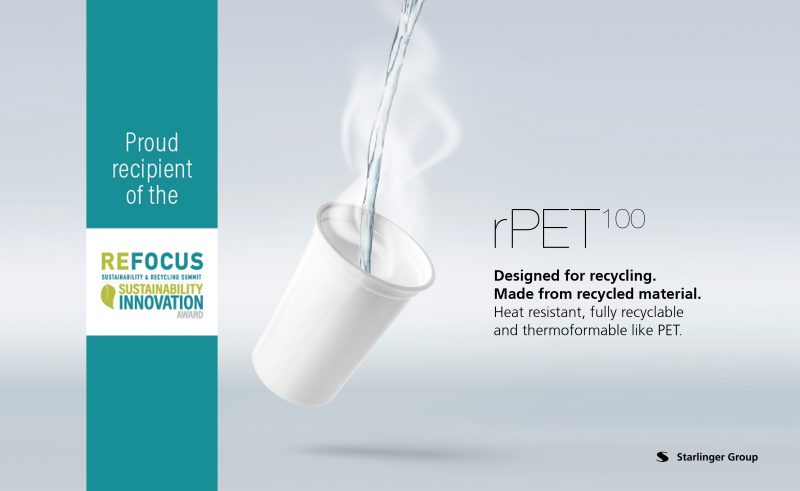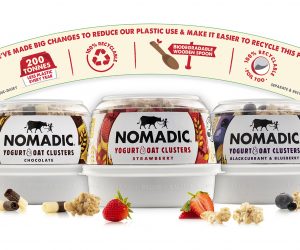

Starlinger viscotec: Heat resistant and fully recyclable rPET100 material wins Re|focus Sustainable Innovation in Material Award 2022
The rPET100 sheet material for thermoformed packaging by Starlinger viscotec is a game changer for circular packaging solutions: it is designed for recycling, and it is made from recycled PET
This week the material was awarded the Re|focus Sustainable Innovation in Material Award 2022. The Sustainability Innovation awards recognize outstanding innovations in plastics manufacturing that further environmental advantages in design, material, and end of life management. “We are honored by the award and recognition of our efforts to put cradle-to-cradle recycling into action for a circular economy”, says Jeff Cornell, President of American Starlinger-Sahm Inc, located in Greenville, SC.
The new sheet material is the first packaging material that combines three properties needed to revolutionize packaging for dairy and hot-fill products: the material is heat-resistant up to 212 °F (100 °C), it can be made from 100% recycled content, and it is 100% recyclable in food-grade quality. This makes it the environmentally sustainable alternative to single-use cups, tubs, and trays made from polyolefins, whose material properties degrade with each recycling loop. Besides, polyolefin recyclates are not approved for food contact as secondary raw material in Europe according to efsa.
Sustainable packaging material choice
According to Cornell, the need to incorporate thermoformed packaging into the recycling stream has been a major objective when developing the rPET100 sheet material. “We observe a strong food packaging trend towards increased post-consumer recycled (PCR) content. Many brand owners have committed to increasing PCR content in water and carbonated soft drinks bottles. These commitments have driven demand and prices up for clear post-consumer recycled bottle flakes. rPET100 helps to tackle this challenge because both PET tray and bottle flakes can be the feedstock for the recycled material. After its use, rPET100 packaging can be recycled back into food and beverage packaging.”
rPET100 material only contains natural-based mineral fillers, and no other stabilizers or other polymer additives, which would impede recycling in the food packaging loop. Perfect recyclability is the key requirement to enable tray-to-tray recycling while maintaining the highest packaging quality in terms of mechanical strengths and a high-quality optical appearance. Ultimately, thermoformed rPET packaging that is recycled after its use, has a significantly lower carbon footprint.
rPET100 relies on proven and established technology
The material can be produced and recycled with the existing mechanical recycling technologies established in the market. In a solid state polycondensation unit, post-consumer PET flakes are decontaminated to produce food grade PET flakes. The material is fit for direct food contact after this super-cleaning process. Plus, the mechanical properties are restored by increasing the intrinsic viscosity of the material, up to the levels of virgin material. Starlinger viscotec’s PET sheet extrusion lines are intentionally designed to produce sheet made from recycled PET and can run 100% recycled material. “The technology and machinery needed to produce and recycle thermoformed packaging made from rPET100 is available and established in the recycling and packaging industry”, highlights Cornell. He adds another important point for packaging manufacturers. “rPET100 sheet material is thermoformable like conventional PET, polypropylene, or polystyrene.”





